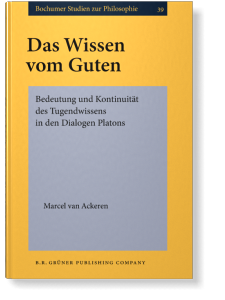Das Wissen vom Guten
Bedeutung und Kontinuität des Tugendwissens in den Dialogen Platons
These conclusions are reached by an investigation, which traces the continuity and the development of the relation between virtue and knowledge throughout the different phases in Plato’s philosophy. The leading thesis of this book is unitarian, but in order to corroborate it the methodology is used of those scholars who think that Plato’s philosophy has changed significantly through the dialogic phase. This way, it can be shown that Plato kept developing new justifications for the same relation between virtue and knowledge.
Diese Untersuchung der Beziehung von Tugend und Wissen konzentriert sich auf folgende Aspekte: i) Sowohl Tugend als auch Wissen können erkannt werden; ii) Tugend ist Wissen; iii) Die Wissenssuche wird durch das Glücksstreben finalisiert. Daher bestimmt Platon Philosophie nicht als Theorie, sondern als Suche nach der Weisheit, um glücklich zu leben. Entsprechend unterscheidet Platon keine Teilbereiche der Philosophie, die unabhängige Ziele verfolgen.
Diese Schlussfolgerungen werden erreicht durch eine Untersuchung, die die Kontinuität und Entwicklung der Beziehung von Tugend und Wissen durch die verschiedenen Phasen in der Platonischen Philosophie verfolgt. Die leitende These ist unitarisch, aber um sie zu bestätigen wird die Methode derjenigen verwandt, die annehmen, die Platonische Philosophie hätte sich in durch die Dialogphasen wesentlich entwickelt. So kann gezeigt werden, dass Platon immer neue Begründungen für dieselbe Beziehung von Tugend und Wissen entwickelt hat.
Table of Contents
-
Vorwort | p. v
-
Inhaltsverzeichnis | p. ix
-
Einleitung | pp. 1–4
-
I. Die Frühdialoge | pp. 5–122
-
II. Die Politeia als ethisches Argument | pp. 123–212
-
III. Die Spätdialoge | pp. 213–338
-
Schlussbetrachtung | pp. 339–340
-
Literaturliste | pp. 341–361
-
Namenregister | pp. 363–367
-
Sachregister | pp. 369–370
Cited by
Cited by 3 other publications
This list is based on CrossRef data as of 15 april 2024. Please note that it may not be complete. Sources presented here have been supplied by the respective publishers. Any errors therein should be reported to them.
